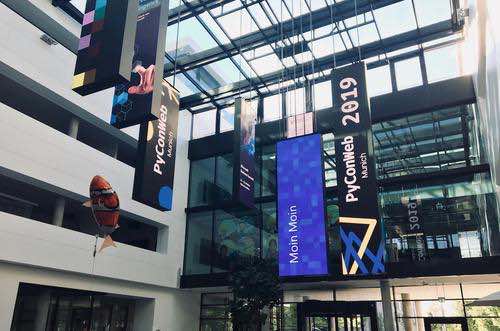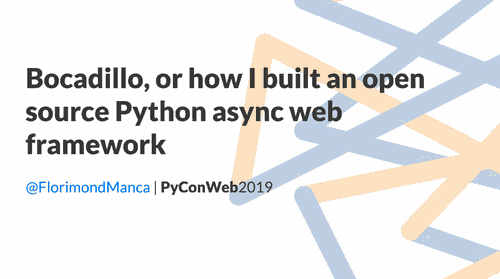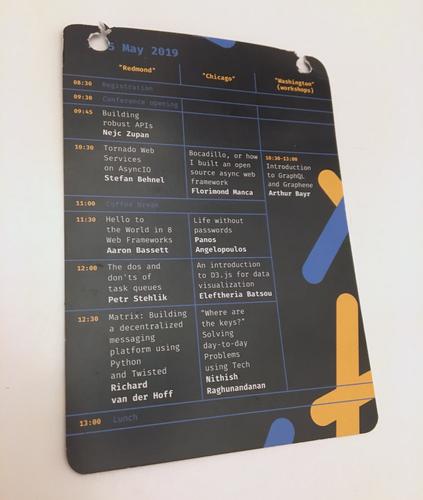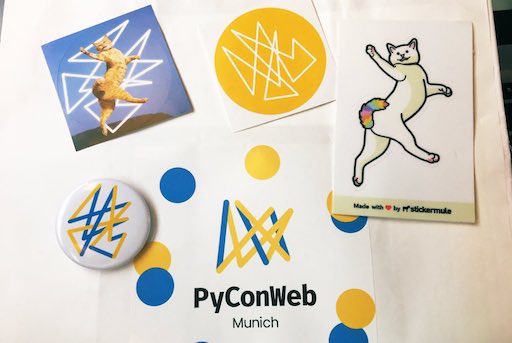Attending Tech Conferences: A Beginner's Guide
Tips for attending tech conferences based on my experience at PyConWeb 2019.
PyConWeb is a conference focusing on Python, web development, and related technologies. The 2019 edition took place on the 25th and 26th of May in Munich — and I was there! 🙌

Going to this conference was very special for me. It was the first time I had attended a tech conference, but also given a tech talk!
The talk I gave was about Bocadillo, async Python for web development, and open source, and lasted 30 minutes. It was a great opportunity to explain the concepts behind ASGI, highlight some key Bocadillo features, and share what I'v learnt about maintaining open source projects. All in a 10-question long "Q&A with myself" format. If you're interested, the slides are available on GitHub. ✨

In this post, I want to share with you what I've learnt about attending tech conferences, and give away actionable tips if you plan to attend yourself!
Basics
What is a tech conference?
A conference is an event in which professionals and hobbyists interested in a particular topic gather to learn, train, and share ideas about this topic.
There are conferences for many different types of audiences, such as researchers, business people, engineers, etc. Many different activities take place, but talks and workshops are the most common.
Even among tech conferences though, a vast amount of topics exist. Conferences are often organised around a technology (a programming language, a framework, …) or field (frontend development, security, etc.). For example, PyConWeb is "a conference about web tools in Python".
Why should I attend?
There are probably as many reasons for going to tech conferences as there are people attending them. So my answer would be that it depends on you!
Do you want to learn about a particular topic, get involved in networking (i.e. meeting and connecting with new people), find a job, or simply have a good time?
Most of the time though, I'd say it's a combination of these.
Personally, I went to PyConWeb first and foremost because I was giving a talk there (very good reason on its own, right?), but also because I like Python and web development and I was curious to know what a conference on this topic would look like. To be honest, I didn't really know what to expect, but in the end I learnt a lot and got to meet a lot of new friendly people.
Do I need to be an expert to attend conferences?
Absolutely not!
Let me reiteriate, as I think this is a very important point: everyone belongs to conferences!
There's no such thing as "qualifying" or "not qualifying" for a conference. Everyone is welcome regardless of their technical level or knowledge of the field. You're here to learn, after all!
I met people at PyConWeb 2019 who were getting started with or transitioning into Python and/or web development, and also experts in more specific domains.
The people is what makes attending conferences so uniquely fun, so join and be part of it!
How do I find conferences?
At first, it may not be obvious where you should look for the upcoming events.
One easy way to find them is to simply ask a search engine. For example, making a search for "python conferences" yields results about conferences around me (e.g. PyConFR), but also websites that list such conferences, such as python.org, pycon.org or confs.tech.
Twitter is also a great way to hear about upcoming conferences. Just search for "conf", and you'll find tons of official conferences accounts to look at!
Deciding on a conference to attend
Since there is a lot of possible conferences you can attend, which one(s) should you choose?
I'd say that the following criteria are enough to help you decide:
- Topic: it may be obvious, but select a conference which you will be interested in.
- Location: finding a conference near your place is probably best at first, but you may also want to take the opportunity to travel in another city or country.
- Size / popularity: both smaller and larger conferences have their pro's and con's. Small to medium conferences (like PyConWeb) feel more like a family reunion, while larger conferences obviously tend to attract very notorious speakers and shiny sponsors, but can be harder to navigate.
- Price: some conferences are more expansive than others — even though it does not necessarily reflect the quality of the event.
- Dates: again, it may be obvious, but be sure that you will be available to attend. If you're not, no worries — conferences happen at all times of the year!
You may also want to take a look at testimonials, and what people said about the previous editions.
It's now time to dig into more specific tips about what to do before, during and after the conference!
Before the conference
Getting your ticket
So you've chosen a conference, and you're excited to go — nice! It is now time to get your ticket.
Indeed, in general conferences are not free. From what I've seen, ticket prices range from 60-70€ for the smaller conferences up to a few hundred € for the largest events.
There are actually many costs that come with organizing a conference, including paying for the venue, logistics, or security. Many conferences have sponsors though, which helps them reduce the price.
If you can't afford the price yourself, it's probably a good idea to investigate whether your employer could help, e.g. via a yearly self-learning budget.
If you're a student, many conferences have special student tickets which are often less expensive.
At PyConWeb, I paid about 45€ for the entry, which is a 90€ student ticket with a 50% speaker discount. The entry ticket was all-inclusive: talks, workshops, and food and beverages. This may not be the case for all conferences, though. In particular, some conferences may charge extra for workshops.
Logistics
Depending on the location, you may need to book accommodation and transportation, all of which come at a price as well.
PyConWeb took place in Munich, so I had to travel from Paris and book a place to stay. This represents about 200€ on transportation (train and metro fares) and about 150€ on accommodation.
There are often many possible options, and I recommend taking the time to compare prices.
It's best to figure out the logistics one week before the conference, so that you arrive at the conference as relaxed as possible, ready to enjoy your time.
Preparation
Even though you're not giving a talk, in my opinion attending a conference requires some preparation in order to get the most out of it.
A few days before the conference, it's a good idea to skim through the list of talks and workshops, and see which ones you may want to attend.
The day before the conference, the PyConWeb team had setup a mobile web app, with the schedule, speakers bios and practical information listed. I could fav the talks there, and learn about the other speakers' backgrounds. Not all conferences provide an app, but if they do I highly recommend using it!
The PyConWeb team also had a discussion chat. If the conference you go to has one as well, join and say hi! It's a good way to introduce yourself and see who else will be there.
During the conference
Now that you've arrived at the conference, what should you do? Let's take a closer look!
Talks
Talks are without a doubt the highlight of any conference. Speakers come from all around the world to talk about their experience, share ideas, and make sure the audience enjoys their time. Talks are selected by conference organisers to be as diverse and interesting as possible.

All that said, attending all the talks is generally impossible.
Most conferences have more than one track of talks, which means that two or more talks take place at the same time. As a result, you'll have to decide which talk you want to attend.
Some conferences record talks and make them available online afterwards — if that's the case, you can be looser on which talks to decide to see.
So, which talks should you prioritise?
I think you should primarily attend talks about topics you don't know, or topics you know about that are presented in an original way. After all, you're most likely here to learn, right?
Also, and this may be counter-intuitive, I think you should go to at least one talk that you think won't be interesting to you, or that doesn't sound very sexy. You may be surprised about what you discover, and will help fill what could have otherwise been an empty room (which is probably a speaker's worst fear).
During a talk, I highly recommend you take notes about key points or questions you may want to ask. Personally, it helps me memorise key learning points better. If you do so, prefer using pen and paper instead of your laptop, as it is less intrusive for both the speaker and other attendees.
If the talk turns out to be a bit boring, refrain from zoning out and starting browsing your phone. It can be disheartening to the speaker, make them even less at ease and worsen the experience for everyone. Instead, take it as an opportunity to observe what makes the talk boring.
After the talk, you can (should?) reach out to the speaker if you enjoyed the talk, and tell them why you found it interesting. Speakers are always up for feedback and ways they can improve! Obviously, you can also ask them anything unclear or you'd like more information about.
In the hallway, you can also discuss the talk you've just seen with other attendees, or ask those who went to other talks what they thought about it.
Other activities
Although talks are the main activity at most conferences, there are many other activities going on.
One of these activities is workshops. They're typically longer than talks (2 to 3 hours) and consist in a hands-on session about a tool or technology.
For example, I decided to attend a workshop by Ben Parsons about real-time asynchronous messaging with Matrix, and I enjoyed it a lot!
Another activity organised at PyCon events is lightning talks. They consist of very short 5-minutes talks which anyone can give, and they're often very fun to attend.
There may also be sponsor booths in the hall. It can be a good idea to go and say hi, e.g. if you're interested in career opportunities or just to get some sponsor swag (stickers, bookmarks, etc).
Lastly, be sure to attend the conference opening and conference announcements. They're definitely not as boring as they seem (bad jokes inside!), and organizers may announce fun special contests or events which you can participate in. For example, PyConWeb had a selfie contest going on, as well as an open brainstorming session for the name of The Cat, the conference's mascot (which was finally elected to be CharField!).

Social media
If you're into social media, conferences are an incredible source of inspiration for posts and Tweets. As a matter of fact, people are typically more active than usual during a conference, so don't be shy!
During my talk, some attendees tweeted — I had placed my Twitter handle in the footer of each slide — and it was great to see, because it probably meant that they thought the talk was worth sharing. I also tweeted a lot about other people's talks!
By the way, it's definitely okay to get your phone out, take a picture, and publish something about the talk. But be sure to do it in a way that doesn't prevent other attendees from enjoying the talk. Try to do it quickly, or you risk zoning out and missing on some interesting content. To avoid this entirely, you can also take a picture and write the post after the talk.
Networking
Attending a conference is a fantastic opportunity to meet and connect with new people. In fact, it's probably the main motivation for many attendees. I was very impressed myself about how many new people I met at PyConWeb!
Meeting new people turned out to be very easy:
- Identify someone or a group of people you don't know yet.
- Say hi, tell your name, shake hands.
- Strike a conversation!
I think this was even easier since I came by myself at the conference. I know I would've been tempted to stick with my team or colleagues if I came with other people.
Once you're in, remember to encourage the PacMan shape. In other words, leave a small gap open instead of forming a closed circle. It shows to people looking for a group that they are welcome to join.
If you're unsure about what to talk about, there are actually many possible topics. For example, you can ask other people:
- What motivated them to come to the conference.
- How they relate to the topic of the conference. At PyConWeb, I enjoyed asking other people what web frameworks they used, or what they used Python for and how they got into it.
- Where they're traveling from, how long they plan to stay.
- Which conferences or events they've been to in the past.
- …
The list is endless! Just listen and bounce off the answers. Also, be ready to answer those questions yourself!
Another great thing about conferences is that a lot of them are international. I obviously met attendees who were from Munich or Germany, but also people from Canada, Portugal, the UK, Singapore, India, and Slovenia!
Note that if you're a local but the conference is international, the language for talks and hallway chit-chat will probably be English.
As a final note, be aware that networking and socialising can be exhausting, especially if, like me, you are a bit of an introvert.
Actually, you shouldn't feel obliged to be constantly talking to people. It's okay to take a break, sit somewhere alone, and recharge your batteries.
Everyone has their limits, so remember to take care of yourself so that the conference remains a memorable experience.
Behavior
A lot of conferences have a code of conduct, which is a short document that frames how people should behave during the conference.
The PyConWeb code of conduct is a few pages long, but the tl;dr which was given to us at the conference opening was:
We're all adults. Be nice to people, and expect the same in return.
After all, a conference is a professional event, which means you're supposed to behave as a professional.
That doesn't mean it has to be formal — you can totally have informal and fun discussions with speakers and other attendees. The Saturday night party was a good example of this!
But while doing so, be sure to stay respectful, open-minded and inclusive.
After the conference
When the official program is over, there are still many ways you can keep your conference experience going.
First and foremost, say thanks to the organizers and the crew! They worked hard to organize the conference and make sure everything goes smoothly. You know they succeeded in doing so when you can't even notice the work they've done before or during the conference. So reach out to them, and say thanks!
For example: did you like the selection of talks? Was the schedule well-managed? Did you enjoy the extra activities? Tell them! You can do it in many ways: in person, on social media, in the chat, etc.
Another thing you can do is reach out to people you met during the conference. Thank them for your discussions, offer to meet again sometime, and follow up on conversations you've had. A nice time to do this is after the final round of talks.
If you've exchanged contact info (Twitter, LinkedIn, phone, email…) you can also stay in touch after everyone went home.
Outside of extended networking, there are things you can do on your own.
For example, try to apply one or two things you've learnt during the conference to a practical project. If you do, remember to share it with the speaker!
For example, I created fetch-metadata-asgi, a PoC ASGI middleware for the upcoming Fetch Metadata specification. This was a follow up on the talk given by Lukas Weichselbaum about new web security features.
Lastly, it's definitely a good idea to take the time to reflect on your experience. If you have a blog, you can write a blog post and share it with attendees and organizers. Examples from PyConWeb 2019:
- This very blog post!
- Came for the talks, stayed for the raffles by Jürgen Gmach — great summary with links to slides and source code for the talks.
- PyConWeb 2019 by Jesse Stippel.
Wrapping up
PyConWeb 2019 was full of first times for me: first time in Germany and in Munich, first time attending a tech conference, and first time giving a talk at a conference!
I genuinely enjoyed it. It made me consider getting more into public speaking, and attending more conferences — from the Python community in particular. I just learnt that PyConFR 2019 was confirmed for October, so that might be my next stop!
I will be writing up my experience of speaking at PyConWeb in an upcoming blog post, in a similar format: "Speaking at Tech Conferences: A Beginner's Guide". Stay tuned, and in the meantime you can view the slides for my talk on GitHub.